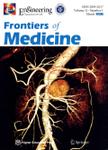Resveratrol reduces intracellular reactive oxygen species levels by inducing autophagy through the AMPK-mTOR pathway
作者机构:Shanghai Diabetes InstituteShanghai Key Laboratory of Diabetes MellitusShanghai Key Clinical Center for Metabolic DiseasesShanghai Jiao Tong University Affiliated Sixth People's HospitalShanghai 200233China Department of EndocrinologyQilu Hospital of Shandong UniversityJinan 250012China Department of EndocrinologyShanghai East HospitalTongffi University School of MedicineShanghai 200120China Department of GeriatricsQingdao Haici Medical Treatment GroupQingdao 266000China Huangdao Disease Prevention and Control CenterQingdao 266555China
出 版 物:《Frontiers of Medicine》 (医学前沿(英文版))
年 卷 期:2018年第12卷第6期
页 面:697-706页
核心收录:
学科分类:10[医学]
基 金:outstanding young scientist research grant in Shandong Province (No.2013BSE27128) National Natural Science Foundation of China (No.81370943) China Postdoctoral Science Foundation (No.2015M580334) Shanghai Municipal Health and Family Planning Commission Project (No.20134189)
主 题:resveratrol reactive oxygen species AMPK mTOR autophagy
摘 要:Oxidative stress induced by free fatty acid aggravates endothelial injury, which leads to diabetic cardiovascular complications. Reduction of intracellular oxidative stress may attenuate these pathogenic processes. The dietary polyphenol resveratrol reportedly exerts potential protective effects against endothelial injury. This study determined whether resveratrol can reduce the palmitic acid (PA)-induced generation of reactive oxygen species (ROS) and further explored the underlying molecular mechanisms. We found that resveratrol significantly reduced the PA-induced endothelial ROS levels in human aortic endothelial cells. Resveratrol also induced endothelial cell autophagy, which mediated the effect of resveratrol on ROS reduction. Resveratrol stimulated autophagy via the AMP-activated protein kinase (AMPK)-mTOR pathway. Taken together, these data suggest that resveratrol prevents PA-induced intracellular ROS by autophagy regulation via the AMPK-mTOR pathway. Thus, the induction of autophagy by resveratrol may provide a novel therapeutic candidate for cardioprotection in metabolic syndrome.



